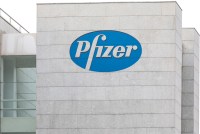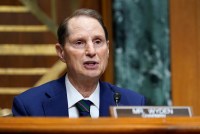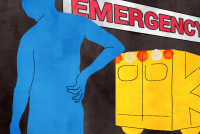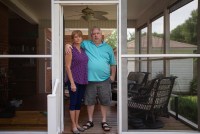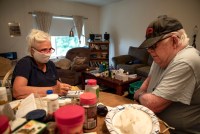Latest Morning Briefing Stories
Olympic Dream Dashed After Bike Crash and Nightmare Medical Bill Over $200K
A bicyclist from California competed in a Pennsylvania race that could have landed him in this month’s Tokyo Olympics. Instead, a crash on the velodrome track landed him in two hospitals where his out-of-state, out-of-network surgeries garnered huge bills.
Pfizer Court Fight Could Legalize Medicare Copays and Unleash ‘Gold Rush’ in Sales
Pharmaceutical companies routinely cover the cost of patient copays for expensive drugs under private insurance. A federal judge could make the practice legal for millions on Medicare as well.
Bye-Bye to Health Insurance ‘Birthday Rule’? Kansas Lawmaker Floats Fix
U.S. Rep. Sharice Davids (D-Kansas) introduced a bill to do away with a health insurance rule that dictates which parent’s plan becomes a new baby’s primary insurer. This could save some parents from unexpected, sometimes massive medical bills. Davids took up the issue after a KHN/NPR Bill of the Month story on one family’s unexpected $207,455 NICU bill.
Facing Headwinds on New Alzheimer’s Drug, Biogen Launches Controversial Campaign
The makers of Aduhelm, a drug approved last month despite concerns raised by experts about its effectiveness, have launched a website and ads designed to urge people who are worried about their memory to ask doctors about testing. But some health advocates say it is misleading because some memory loss with aging is normal.
KHN’s ‘What the Health?’: Delta Changes the Covid Conversation
With covid cases on the upswing again around the country, partisan division remains over how to address the pandemic. Meanwhile, the Biden administration proposes bigger penalties for hospitals that fail to make their prices public as required. Stephanie Armour of The Wall Street Journal, Alice Miranda Ollstein of Politico and Tami Luhby of CNN join KHN’s Julie Rovner to discuss these issues and more. Also, for “extra credit,” the panelists suggest their favorite stories of the week they think you should read, too.
Though Millions Are at Risk for Diabetes, Medicare Struggles to Expand Prevention Program
Medicare has proposed revamping its payment rules to get more people into a diabetes prevention plan that helps them eat better, exercise more and maintain a healthier lifestyle. Out of an estimated 16 million Medicare beneficiaries whose excess weight and other risk factors make them eligible, only 3,600 have participated since 2018.
El acuerdo sobre el presupuesto estatal para 2021-22 incluye varias disposiciones que facilitarán el acceso y la permanencia en Medi-Cal. Todas las personas mayores de 50 años serán elegibles, independientemente de su estatus migratorio.
California Makes It Easier for Low-Income Residents to Get and Keep Free Health Coverage
State lawmakers aim to expand Medicaid enrollment by dedicating billions of dollars in coming years to simplifying paperwork, extending pregnancy coverage and opening the program to thousands of new enrollees, including older unauthorized immigrants and people who need nursing home care.
Sen. Wyden: $3.5T Budget May Have to Trim but It Can Set a Path to ‘Ambitious Goals’
Sen. Ron Wyden (D-Ore.), who is helping to negotiate the health care spending framework for the Democrats’ budget plan, said lawmakers may have to settle for very basic versions of programs deployed in the package. But the key, he added, is to get the “architecture of these changes, bold changes,” started and show people what is possible.
Hospital ‘Trauma Centers’ Charge Enormous Fees to Treat Minor Injuries and Send People Home
Only severely injured patients are supposed to be billed for “trauma team alert” fees that can exceed $50,000.
KHN’s ‘What the Health?’: Here Comes Reconciliation
Democrats in Congress reached a tentative agreement to press ahead on a partisan bill that would dramatically expand health benefits for people on Medicare, those who buy their own insurance and individuals who have been shut out of coverage in states that didn’t expand Medicaid. Meanwhile, controversy continues to rage over whether vaccinated Americans will need a booster to protect against covid-19 variants, and who will pay for a new drug to treat Alzheimer’s disease. Rachel Cohrs of Stat and Sarah Karlin-Smith of the Pink Sheet join KHN’s Julie Rovner to discuss these issues and more. Also, Rovner interviews KHN’s Rae Ellen Bichell, who reported and wrote the latest KHN-NPR “Bill of the Month” episode about a mother and daughter who fought an enormous emergency room bill.
How ERs Fail Patients With Addiction: One Patient’s Tragic Death
Two intractable failings of the U.S. health care system — addiction treatment and medical costs — come to a head in the ER, where patients desperate for addiction treatment arrive, only to find the facility may not be equipped to deal with substance use or, if they are, treatment is prohibitively expensive.
Dying Patients With Rare Diseases Struggle to Get Experimental Therapies
When patients with common terminal illnesses such as cancer seek permission for compassionate use of therapies in the testing stage, their requests often are approved. But those with more unusual illnesses say drug companies are rarely willing to provide access.
Why We May Never Know Whether the $56,000-a-Year Alzheimer’s Drug Actually Works
It could take years for follow-up studies to prove Aduhelm slows the disease — or doesn’t. Meanwhile, its maker will profit.
Effort to Decipher Hospital Prices Yields Key Finding: Don’t Try It at Home
Your dutiful columnist tried to make use of a federal “transparency” rule to compare the prices of common medical procedures in two California health care systems. It was a futile exercise.
Paying Billions for Controversial Alzheimer’s Drug? How About Funding This Instead?
Aduhelm, approved by the Food and Drug Administration last month despite questions about its efficacy, could be prescribed to at least 1 million patients a year, for a price tag of about $56 billion. Experts suggest there might be better ways to spend that money.
‘An Arm and a Leg’: Tips for Fighting Medical Bills from ProPublica’s Marshall Allen
Veteran health journalist Marshall Allen has been exposing health care grifters for years. Now he’s written a book about how to fight them. Host Dan Weissmann spoke with Allen about some of the best tips from “Never Pay the First Bill: And Other Ways to Fight the Health Care System and Win.”
Hospital Prices Must Now Be Transparent. For Many Consumers, They’re Still Anyone’s Guess.
A Trump administration rule mandating that hospitals disclose true prices on their websites took effect this year. But compliance is spotty and even when the data is public, it’s hard to find and understand.
Desperate for Home Care, Seniors Often Wait Months With Workers in Short Supply
The covid pandemic and President Joe Biden’s agenda — a planned $400 billion infusion of support — have focused national attention on the need to expand home- and community-based long-term care services designed to keep people out of nursing homes. But the need far outpaces the staffing.
A Hospital Charged $722.50 to Push Medicine Through an IV. Twice.
A college student never got an answer for what caused her intense pain, but she did get a bill that totaled $18,736 for an ER visit. She and her mom, a nurse practitioner, fought to understand all the charges.




